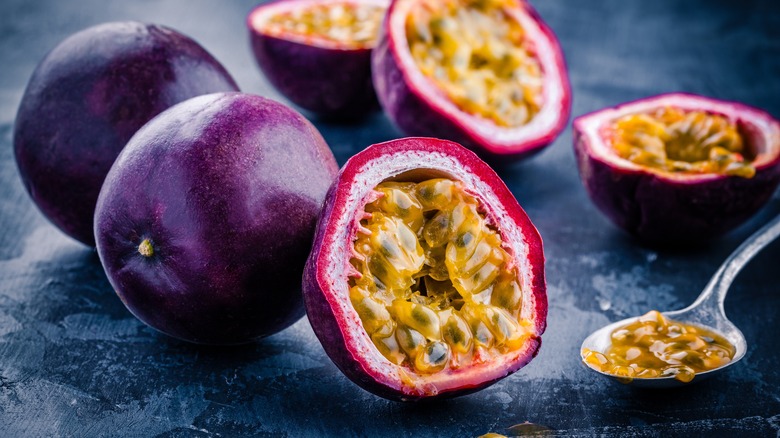The Health Benefits Of Adding Passion Fruit To Your Diet
One colorful, yet exotic fruit that's constantly finding itself on a smoothie or cocktail menu is passion fruit. This little wonder may also find itself atop yogurt and salads or enjoyed by the spoonfuls (per Healthline). Passion fruits are egg-shaped and have tough outer peels that are either purple or yellow. Slice them open and you'll find gelatinous yellow sacs with seeds that are subtly tart, but edible (per Healthline). So whether you prefer it served with a savory twist or a sweet finish, there's one thing all passion fruits have in common — they offer a lot of health benefits.
For starters, passion fruit is extremely nutrient-dense. In fact, one purple passion fruit contains 17.5 calories and almost two grams of fiber, points out the U.S. Department of Agriculture (USDA). They also hold high amounts of vitamins C and A, iron, potassium, and magnesium. In addition, they're chock full of antioxidants. In fact, one 2016 study reports that passion fruit consists of higher levels of polyphenols, which are antioxidants, than many other popular tropical fruits, such as bananas, mangos, pineapples, litchi, and papaya.
Passion fruit seeds also carry plenty of piceatannol — a type of polyphenol that can be greatly beneficial for some (via Healthline). One small-scale 2017 study even found that piceatannol could boost metabolic health in overweight men. More specifically, the researchers discovered that passion fruit can improve insulin sensitivity and heart rate.
Passion fruit supports your immune system and heart health
Luckily, the advantages of adding passion fruit to your diet don't stop there. For instance, the high vitamin C content supports your immune system, points out Medical News Today. Since vitamin C is an antioxidant that protects your cells from damage and reduces inflammation, it could also ward off infections, lower the odds of getting sick, and reduce the risk of some cancers, shares WebMD.
The high vitamin A content, on the other hand, keeps your immune healthy and supports eye, reproductive, and cellular health. Keep in mind, one serving of passion fruit gets you 8% of the daily recommended serving of vitamin A (per Healthline). Since passion fruit is loaded with fiber, potassium, and are low in sodium, they're considered heart-healthy fruit (via Medical News Today). In fact, one 2020 review article reports that passion fruit has the ability to lower blood pressure levels. During the review, researchers also mentioned that the fruit possesses some sedative activity, which may help with insomnia.
All in all, passion fruit can be a healthy addition to any diet. But before consuming it, make sure to thoroughly rinse the fruit off to get rid of any bacteria. Then slice it in half and scoop out the insides. At this stage, consider enjoying the fruit raw, or blending it in with a smoothie.


